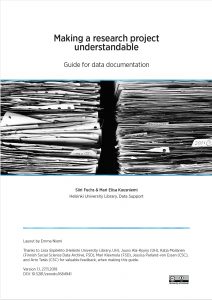University of Helsinki’s DataSupport has published a guide for research data documentation. The guide introduces the basic elements of documentation and meets the needs of most researchers.
(Tämä artikkeli on saatavilla myös suomeksi.)
How can I get started on documenting my research data? Where can I find clear and detailed instructions for documentation?

A new guide, Making a research project understandable – Guide for data documentation, answers the questions of researchers. It brings together the basics of data documentation in 12 pages. The guide has been written by information specialists Siiri Fuchs and Mari Elisa Kuusniemi from the University of Helsinki’s DataSupport.
”We have been lacking a guide that gathers together fundamental elements of data documentation. There’s a lot of information about this topic, but many guides only introduce parts of the subject. When reading researchers’ data management plans (DMP), I have noticed that only a few people understand what documentation means”, Fuchs says.
”This guide introduces the essential elements of documentation and for most people, the level presented here is sufficient. Data scientists and data managers are a different matter”, Kuusniemi says.
Documentation is a basic skill
The documentation guide is intended for anyone who does research. Documentation is a basic skill for researchers, and it should be taken in consideration both during and after a research project – the guide helps in both phases.
”The guide is useful for people who are interested in the quality and the efficiency of their research – and for those who want to open data. The guide can be used by anyone who wants to implement FAIR principles in the organization”, Kuusniemi says.
The FAIR data principles describe the goals for open data: open data requires that data are Findable, Accessible, Interoperable, and Reusable.
The guide can be utilized in many ways
| Three points about documentation |
|
Obviously, summarizing data documentation in 12 pages has called for pruning. For example, the theme of file formats was seen more related to storing and archiving than documentation. Although everything is not thoroughly explained in the guide, it gives tips on how to find further information.
For some researchers, the guide may seem self-evident. However, the summary of basic elements of data documentation (on page 4) can be helpful as a checklist in the research project.
”You can check what is missing. And if the research involves a number of people, the guide will keep everyone informed of basic documentation methods as well as help in introducing new people to the topic”, Kuusniemi says.
The guide is also suitable for training and teaching.
”The guide provides a basis for teaching, and it would be great, if documentation skills would be integrated to university’s bachelor’s or master’s level education”, Fuchs says.
The guide for data documentation will be updated on the basis of feedback. Feedback can be sent to DataSupport: datasupport@helsinki.fi.
